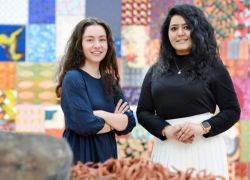Down to the bones
When the phone rings late at night for Dr Tim Thompson, it’s likely to be the police saying they have found a skeleton.
What they need to know is whether they’re dealing with a recent crime or have stumbled across some archaeological remains.
Tim doesn’t mind – he’s used to it. And he sees it as a useful way of sharing his knowledge and expertise as Teesside University’s senior lecturer in crime scene science and digital forensics.
But he does think the identification process could be more accessible for those who, unlike him, don’t have a PhD in forensic anthropology.
Tim recently submitted his digital technology plans to the 2010 Blueprint Business Plan competition, which celebrates enterprise and innovation among North East university staff and students each year. He won the Ward Hadaway Science Award at Teesside’s Blueprint area finals and was highly commended in the Knowledge Transfer Staff category at the regional finals.
That gave him the confidence to polish up his business plan. And, with a grant from Teesside University Enterprise Development Fund and help from a DigitalCity Fellowship, Tim launched his spin-out business, Anthronomics.
‘In much forensic anthropological work, we’re still using pen and paper and stills photography for casework, research and teaching. My idea is to digitalise as much of the process as possible, developing appropriate protocols for scanning the bones into 3D models.
‘Bones are actually very difficult to scan. You’re dealing with holes and pores, lumps and ridges and a combination of organic and inorganic materials. It’s not as easy as you might think.
‘But my new company plans to work with experts at the University, including our own Teesside Manufacturing Centre, to create the scans.’
Tim is also creating new information management software. ‘By importing the bone data straight into the software, we hope to give much quicker information to people who aren’t trained forensic anthropologists – about the sex, age and height of the body. This will be a great help in determining what the police might be dealing with – a recent murder victim or someone who died centuries ago?’
The new company is already established in one of Teesside University’s business incubation units. It’s looking at having its first scans available by the end of 2011 to market to universities, schools and colleges. ‘It will be a great classroom aid for teaching biology, anthropology and forensic science’, says Tim.
‘I wanted to register the company at the University because it’s such a good place to access funding opportunities and the University has been so supportive. As a spin-out of my University work, it makes a lot of sense to base it here.’
 Teesside University academics join prestigious network of
...
Teesside University academics join prestigious network of
... Curatorial studies culminating with international art
...
Curatorial studies culminating with international art
... Teesside animation graduates receive top regional Royal
...
Teesside animation graduates receive top regional Royal
...